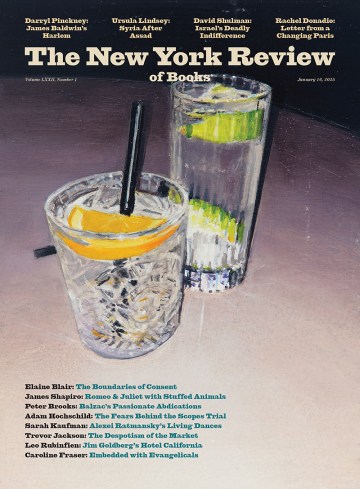This article is part of a regular series of conversations with the Review’s contributors; read past ones here and sign up for our e-mail newsletter to get them delivered to your inbox each week.
In our September 19 issue, Andrew Katzenstein writes about one of Hollywood’s most distinctive contributions to the world: “The hope is that in figuring out what we mean by ‘screwball comedy,’ we might be better able to understand just what it is about these films that transports us.” Surveying dozens of movies from the 1930s and 1940s—about quick-witted, love-smitten archaeologists, professors, reporters, heirs, heiresses, cardsharps, and gentlemen crooks—he tries to identify how the prewar era in studio filmmaking conspired to produce, in Pauline Kael’s words, a “steady flow of bright comedy.”
A former senior editor at the Review, Katzenstein is also a former musician and a frequent dabbler in the eclectic. In our pages he has written about, among many other subjects, the Brazilian novelist Machado de Assis, the European tradition of Kunstkammern, Alice Coltrane, and Thomas Bernhard, and, for Harper’s, Henrik Ibsen.
This week I e-mailed Katzenstein to ask him about Hollywood farces, what to watch when you’re depressed, and the sociability of writing.
Daniel Drake: What are your favorite screwball comedies?
Andrew Katzenstein: The Lady Eve is my favorite. Years ago I tried to memorize all the dialog—in case I ever found myself up the Amazon for a year, perhaps—and would often fall asleep while it played. I still find it a surprise and delight every time I watch it.
A favorite that I didn’t mention in the piece is Bachelor Mother. Ginger Rogers plays a department store worker who picks up a crying baby on the doorstep of an orphanage; everyone assumes the child is hers. It has an excellent cast (including David Niven and Charles Coburn) and script (by Norman Krasna, who had worked at Macy’s while in law school). It also doubles as a satire of the Production Code: Rogers’s supposed moral transgression makes fools out of those who are eager to find offense wherever they look, and the farce allows the movie to get away with a comic plot involving an unwed mother, which the Production Code Administration (PCA) would have otherwise suppressed.
If you had to hazard a definition of screwball—and perhaps a transhistorical one, which might allow for a modern film to be a screwball—what might it be?
Screwball comedy tends to slip out of whatever bounds critics put it in. Criteria that are too rigid prompt readers to come up with counterexamples, while criteria that are too loose can make a definition seem arbitrary. Genres are porous, and screwball comedy contains elements of other comedy subgenres—in fact, it emerged when a bunch of different styles came together in 1930s Hollywood. So a definition has to be precise yet flexible.
The most important aspects of the genre to me are its treatment of love plots—which are central to the films yet portrayed as a source of humor rather than sentimentality—along with the pace and variety of jokes. The humor in screwball comedies is a mix of high and low, with the sort of sophisticated dialog typical of 1920s Broadway drawing-room comedies mingling with cruder wordplay, as well as with silent-era slapstick and French bedroom farce. Screwball films, at least the good ones, never depend on just one type of gag, which is part of what makes them such a pleasure to watch.
Not coincidentally, I fell in love with the genre during periods of depression; the shifting styles of humor kept me engaged in a way few other films or TV shows could. The frantic first act of His Girl Friday may be the best distraction from melancholy that I’ve encountered. That film’s ending, with Rosalind Russell’s Hildy realizing she can never escape her adrenaline addiction even though she’s desperate to settle down, is also rather satisfying if you’re in a dark mood.
As I try to argue in the piece, what seems essential to the screwball style isn’t the existence of a particular censoring body such as the PCA (as some critics have argued) but the focus on social conventions and the awkward ways people try to get around them. The PCA forced writers to address this in a particularly energetic fashion, but every era has its rules and taboos, which are great targets for comedy.
The twenty-first-century film that best exemplifies screwball qualities is probably Intolerable Cruelty, the 2003 Coen brothers movie about a divorce lawyer and a gold digger who fall in love. Romance is treated as a game whose goals are sexual gratification and financial gain. Everyone is plotting something and no one says what they mean, so the constant deceit and circumlocution provide opportunities for all manner of wordplay, which the Coens have such a good ear for. George Clooney is rare among modern stars for his ability to make himself into a complete ass while remaining attractive, a feat that actors like William Powell and Cary Grant accomplished over and over again. Because the story’s legal trappings force a kind of propriety on the characters, the film’s style evokes the tactics screwball writers and directors employed to get around the censors.
Advertisement
I understand that, in writing this essay, you watched nearly all of the 136 films identified by Grégoire Halbout in his book about the genre as the only screwball comedies. Why do you favor a sort of definitive, deadlift approach to writing an essay like this? Is it simply to be sure you don’t miss a trick?
I watched around eighty or ninety of Halbout’s 136 before writing the piece—enough, I suppose, to leave the impression that I’d seen more.
I don’t have credentials, there’s no reason why anyone would care what I think, yet I’m asking for readers’ attention. Having a handle on a subject just seems like part of the job. I have broad interests but shallow knowledge, and I often take on projects in a fit of delusional enthusiasm, which leaves me feeling like an interloper when the work begins. Research is necessary for me to believe I’m giving my subject and those who have written on it the respect they deserve. The odds are always high that someone has already said what I want to say, so it seems necessary to familiarize myself with the literature and give credit where it’s due.
Plus, the more I’ve read (or watched, or listened to), the easier it is to avoid repeating obvious facts that everybody mentions and that readers may already know. What’s the point of writing something that’s already been written?
Aside from a particular emphasis on jazz, your CV is charmingly hodgepodge. How do you decide what to write about? Is there a thread uniting your interests?
Sometimes I think of writing as an exorcism, a way of taking control of something that’s been consuming me. That was the case with the screwball piece. Other times I just think it would be fun to learn about something.
I’m constitutionally a dilettante, and I suffer from chronic esprit de l’escalier. Writing forces me to learn in a methodical way and allows me to speak in extreme slow motion (at least compared to conversation). I suspect a lot of writers develop their style to offset qualities they otherwise find lacking in themselves.
I knew you first as an editor—how do think your long experience editing has affected your approach to writing?
Editing is largely a rehearsal of all the ways a piece of writing might be misunderstood. In a mainstream publication like the Review, your readers are intelligent nonspecialists; you have to give them enough information to follow you without being condescending. If I learned to strike that balance in my own writing, it was by working with other editors at the magazine and learning to anticipate the sorts of things that might cause confusion. Sometimes this means spending most of the space you have on exposition rather than argumentation (which is very different from the kind of writing one has to do in school, where the person reading your work is already familiar with the subject), so you have to set up your argument by arranging facts carefully and with a kind of drama.
Editing also taught me that writing is an extremely social pursuit, not a solitary one. As in any workplace, you depend on people who have plenty of other things to worry about. Writing sloppily is like leaving a mess for someone else to clean up. The more I do to ensure that my writing is clean, easy to follow, and well-sourced, the easier it will be for the staff to get it to press. Of course, I still make mistakes and cause confusion, and I’m grateful when editors save me from myself.
What are you reading these days?
Mostly books for pieces I’m writing, and way too much political news. I did recently find a copy of The Scarith of Scornello, by Ingrid Rowland, at a library book sale. It’s about a Tuscan teenager who created fake Etruscan artifacts in the early seventeenth century and insisted on their authenticity despite numerous objections from scholars. It’s a surprising and informative history told like a true crime mystery, and, like everything Rowland writes, it’s a pleasure to read.



